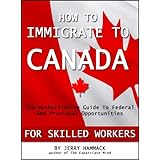My best-selling eBook, "How to Immigrate to Canada for Skilled Workers - The Authoritative Guide To Federal And Provincial Opportunities" is available now from all major online retailers. I'm proud to report that the book has spent some time in its subcategory's Top 20 and Hot New Releases lists on Amazon. I hope that if you are considering Skilled Worker class immigration to Canada you will check it out.
While most books on Canadian immigration are either out of date, or try and cover every single class available, I wrote this book to walk a specific class through the current application process and requirements from top to bottom. Why buy a book where the majority of the content doesn't apply to you?
If you have purchased the book already, please let me know what you think and how it might be improved. New editions are planned and will be published in response to future changes in policy and process.
UPDATE 2013: Changes to the Skilled Worker program and their relation to the book
Since I published my book in April of 2012, there have been some modest changes to the Federal Skilled Worker program. None of these changes have made the book obsolete - it is as valuable to skilled worker applicants as ever. The adjustments the government has made simply re-balance the program's points system to be more in keeping with studies that show younger applicants, and those with strong language proficiency have the best opportunity to integrate into the Canadian economy. There is only ONE new requirement not covered in the book, which is the Educational Credential Assessment. CIC now is requiring applicants to prove their foreign educational credential is authentic and equivalent to a completed credential in Canada.
Here's what's changed in the Federal Skilled Worker Program since the publication of my book:
- There are currently only 24 approved occupation categories that skilled workers must have experience in, in order to apply (these can change at any time, as the government tries to estimate market demand for these skills).
- New language proficiency threshold: Canadian Language Benchmark (CLB) 7 or Niveaux de compétence linguistique canadiens (NCLC) 7 in all four skills (listening, speaking, reading, and writing) is the new level applicants must achieve.
- Arranged Employment - Previously, employers have applied for an Arranged Employment Opinion (AEO) from Human Resources Skills Development Canada when they wished to hire a foreign national on a permanent, full-time basis and support their employee’s application for permanent residence through the FSWP. Starting on May 4, 2013, CIC will no longer accept AEOs in support of an FSWP application. Instead, most offers of arranged employment will require a Labour Market Opinion.
- NEW Educational Credential Assessment (ECA) - Another important change that takes effect on May 4, 2013, is the introduction of the educational credential assessment (ECA). Prospective applicants may start the process of getting an ECA before May 4 if they are planning to submit a foreign educational credential. However, applicants should keep in mind the other program eligibility requirements listed above, i.e. whether they have a qualifying offer of arranged employment or are applying under the PhD stream or eligible occupations stream; and if they meet the minimum language threshold through a designated third-party test. Applicants who have Canadian educational credentials do not need to get an ECA, unless they are also submitting a foreign educational credential in support of their application. You can read more about this new requirement here
Get it today!
For Kindle
For iPad/iPhone
For Nook
For Kobo
For Sony eReader
 |
| My latest book on Family Class immigration is available now! |
My new eBook, "How To Immigrate To Canada In The Family Class: The Authoritative Guide Including Québec And Super Visa Opportunities", is now available on Amazon in multiple territories and coming soon to Sony eBookstore, Apple iBookstore, Kobo, Barnes and Noble and other e-retailers.
I hope this book will help Family Class immigrants in the same way my previous book is helping Skilled Workers. While most books concerning the immigration process are either out of date, or try and cover every possible class, I have made it a point to search out the most current and authoritative information available for those interested in a specific immigration class.
The purpose of this book is to help Family Class applicants in understanding the requirements to successfully apply for immigration to Canada; in being aware of common issues and problems that can arise in the process, and in making plain some of the hurdles and costs that they can expect to encounter along the way.
Family Class applicants will learn who is eligible to apply; what the application process entails; the range of information that they can expect to gather and provide; the pros and cons of using an immigration representative; expectations for the post-application process and other essential information.
Additionally, this book provides detailed information on Family Class immigration to Québec, which, unique to other Canadian provinces, shares immigration jurisdiction with the federal government. Finally, this book provides detailed information on The Parent and Grandparent Super Visa, which allows parents and grandparents of Canadian citizens and permanent residents to visit family in Canada for up to two years without the need to renew their visa status.
If you are planning on becoming a Family Class applicant, this book is a resource that will assist you every step of the way.


